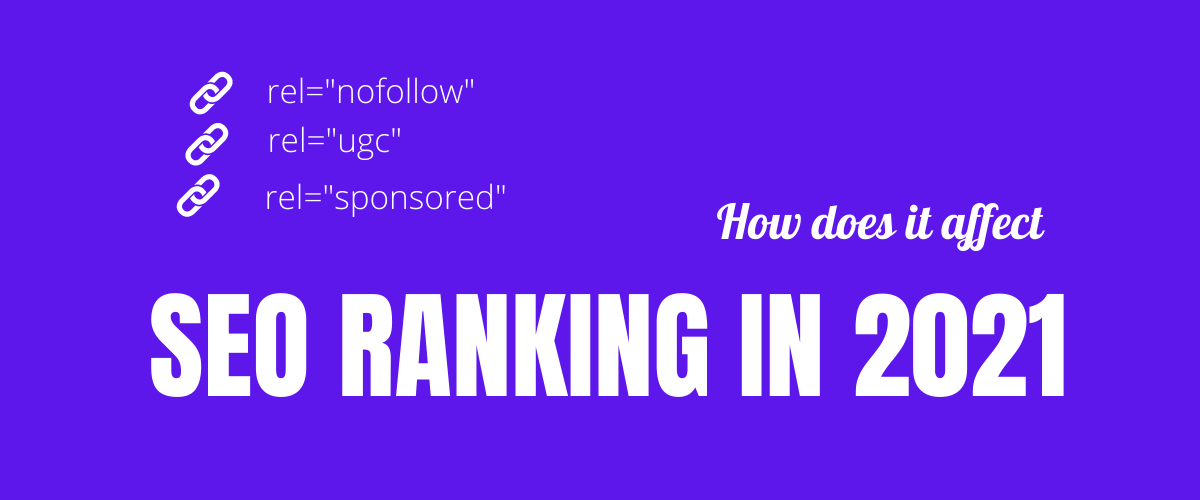Nofollow links have been a dominant feature of the web for over 14 years, with no competition. It was recently that Google announced two more outbound link attributes; namely, user-generated content (UGC) links and sponsored links. The Nofollow, sponsored and UGC links have changed the dynamics of how the web used to create backlinks previously.
It is important to note that the most important phenomenon in the digital marketing world is evolution; and by evolution, we mean constantly growing and coming up with more advanced and better ideas. Stagnancy is the death of the digital marketing world, that too a fast one. Google has always been particular about releasing new updates that facilitate improving SEO rankings. The sponsored and UGC links updates release on September 10th, 2019. To understand these updates and their impact, it is pertinent to understand Nofollow, sponsored, and UGC links. and then move on to the new updates.
Understanding the Nofollow link
A hyperlink with a rel=“Nofollow” tag represents a Nofollow link. in simpler words this means that the Nofollow tag sends a signal to the search engines to ignore a link. It is important to note that the Nofollow links do not pass the PageRank. Page Rank is an algorithmic value that Google analyzes to rank web pages on SERPs. This consequently means that the purpose of the link is not to boost the destination URL in the search engine rankings. A Nofollow backlink could hinder the process of link building. Because it leaves the rankings of the website in no land. A redirect on the website lets users go some other website. However, the domain that directs users to the link synchronously updates Google to refrain from sending any ‘link juice’ along the user’s way.
Nevertheless, the Nofollow links have their own disguised perks. They successfully increase traffic to the website (without affecting the rankings). The other goal is brand awareness. It facilitates leads in discovering and acclimatizing themselves with different B2B opportunities. Nofollow links were announced back in 2005 to combat comment spam. These links could not be vouched for but they do add value to content. Nofollow link is also an attribute of paid links.
Why was there a need for an upgrade from Nofollow links?
The significance and utility of Nofollow links are crystal clear. However, their prevalence resulted in an oversimplified solution to a quite complex issue. Subjective intent should’ve been taken into consideration to include hyperlinks into an account, however, Nofollow links created a clear-cut black and white scenario which was a cause of concern for many businesses. Nofollow links and do-follow links were the only available options for a very long time until the introduction of sponsored and UGC links which shifted the narrative of the digital marketing world to subjectivity.
Release of sponsored and UGC links
The introduction of UGC and sponsored links came as a relief to marketeers because it opened ways for them to actually understand and learn about the intent and use of links. Followed by their introduction in 2019, there have been some amendments to these links. In order to understand why the introduction of these links came as a relief to marketers, it is important to understand what these links are and their uses.
What are Sponsored links?
The sponsored attribute (rel=“sponsored”), which is google’s latest update, refers to the promotional hyperlinks. Before the introduction of sponsored and UGC links, Nofollow links is the only source for promotion purposes. It was quite misleading. Following their introduction, Google is more clear to identify and separate advertising links from others.
The significance of sponsored links cannot be questioned as they have promoted better categorization by making it easier for link providers and receivers to decrypt sponsored links from unreliable Nofollow links.
What is a User-Generated Content (UGC) link?
If a user intends to publish some content on a particular webpage, Google defines it as User-Generated Content or UGC. This attribute facilitates Google in determining links that are generated by users. This development proved to be very instrumental for webmasters who had struggled with indicating that specific hyperlinks were not endorsed.
The UGC links to the sections of websites where content is generated by the users, e.g., the comment sections, forum posts, and others.
Advancements due to the introduction of UGC and Sponsored links
These new developments have eased the reliance on Nofollow links for all purposes. Prior to the introduction of sponsored and UGC links, the Nofollow link was the only link attribute for both user-generated and paid links. The introduction of these new links has made it much simpler to distinguish paid and user-generated content in unique categories.
The use of the Nofollow link or tag is solely for untrustworthy links. Previously, the purpose of the link is not indexing and crawling. However, Google’s 2020 update guide at using the Nofollow link for the purpose of indexing and crawling.
Despite the rosy picture, the utility of these updates is only for the purpose of ranking. These three links; Nofollow, sponsored, and UGC links, reflect a mere hint and not direct ranking factors. In a nutshell, these links will not impact rankings substantially.
Identifying the most appropriate attribute for your business
While all of these attributes are instrumental in the role that they play, they only have the potential to backfire if we don’t apply them appropriately.
- The sponsored attribute or link represents sponsored and paid links.
- The User-Generated Content attribute represents user-generated content.
The Nofollow attribute can link to any specific page. No matter you want to associate with it for any reason-unfamiliarity, or incredibility. This tag will basically indicate that the user does not want to endorse the particular link and thus does not want to offer them any credit ranking.
Effective ways to boost the ranking
It is evident that by using these tags one could successfully categorize one’s content, however, it doesn’t have much of an impact on rankings. There might be some improvement but very negligible. Danny Sullivan, Google’s public search liaison, states that the updates of 2020 and the previous Nofollow link help in generating traffic. He elaborates that this is also a fact that webmasters can adopt other strategies too. A combination of these links can help a substantial boost in ranking.
Some effective ways to climb SERPs include:
Maximizing outcomes by link building
Link building has come forward as the fastest and sustainable method for improving ranking. Link building is basically receiving do-follow backlinks from different websites that have high domain authority which in simpler words is a score that determines the ranking of websites on SERPs.
Building quality backlinks will make Google perceive your website as reliable and authoritative. Google evaluates the quantity and quality of these backlinks to rank websites on SERPs. Hence a boost in rankings results in improved brand identity.
The backlinks from websites with high domain authority are always a better option. 50-60 backlinks are a good start for small businesses.
A couple of good link building strategies include:
- Incorporating a higher number of internal links in the content
- Trying guest blogging
- Listing site in reliable directories
- Contacting respective businesses and converting Nofollow backlinks into do-follow backlinks
- Building stronger connections with non-competing businesses to receive and offer links
- Creating a mobile-friendly website
- Creating, updating, and optimizing content-creating value-added and engaging content to ensure active circulation of SERPs on your website
- Updating old content on regular basis e.g., monthly
Conclusion
Given the competitive world we live in, it isn’t easy to claim a spot and establish yourself in the SEO world. Put some extra effort to preserve your spot. It is important to ensure consistency when creating optimized content or leveraging link building to maintain online visibility and the SERP ranking.



The Overlooked SEO Power of Social Media Backlinks
SDK vs. API: The Key Difference Explained with Examples